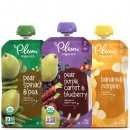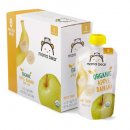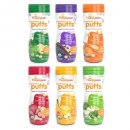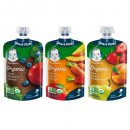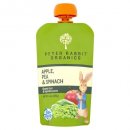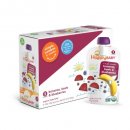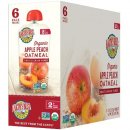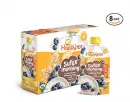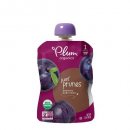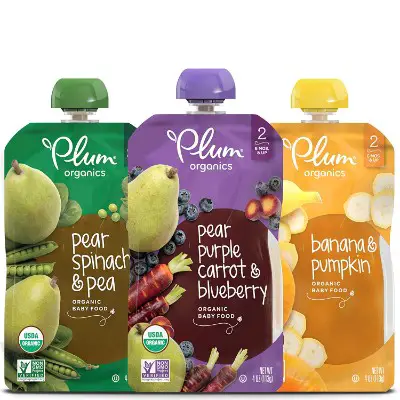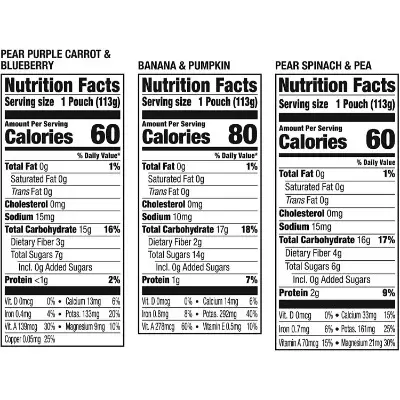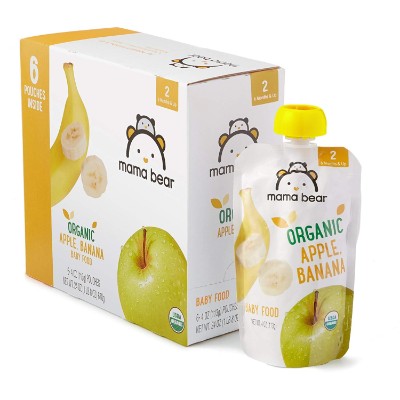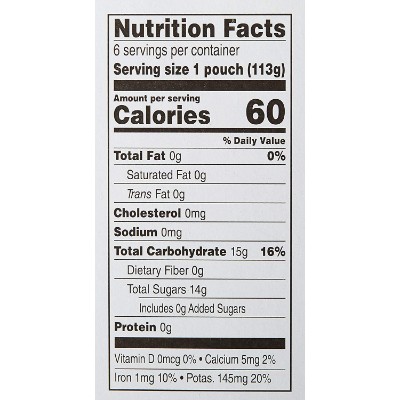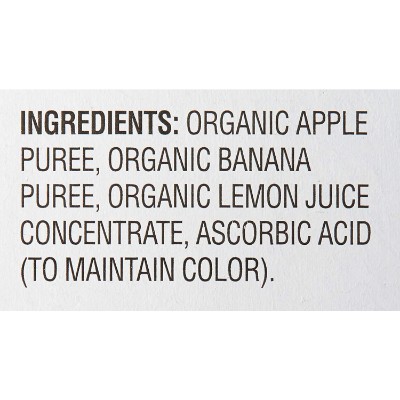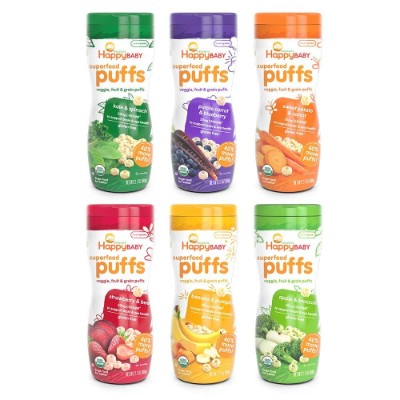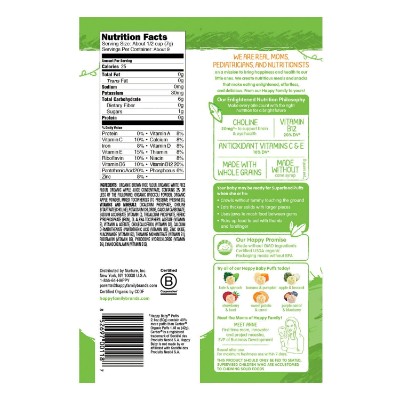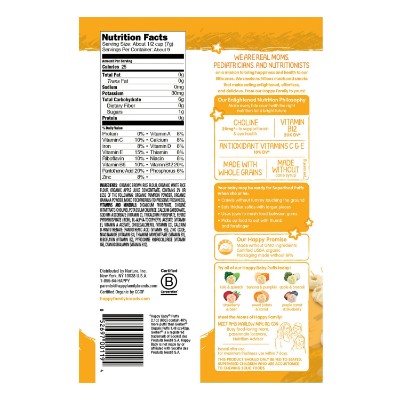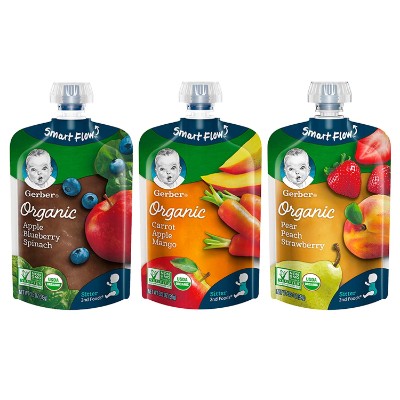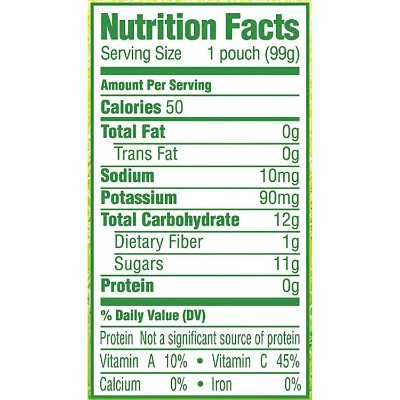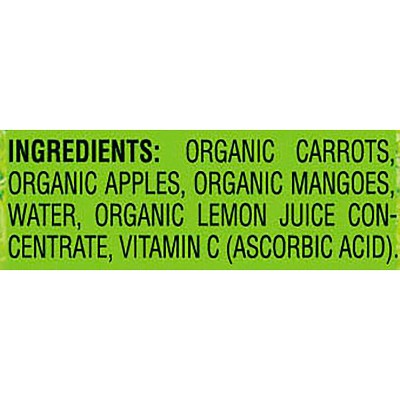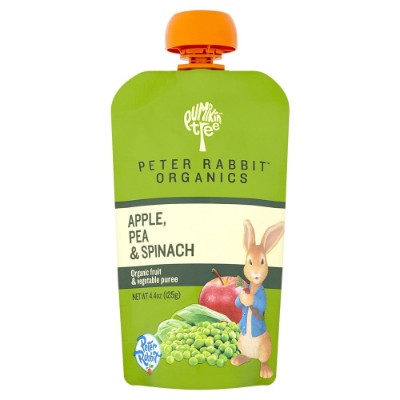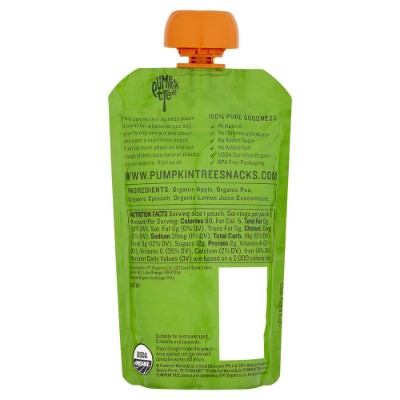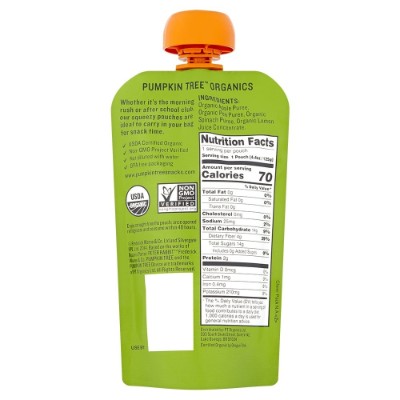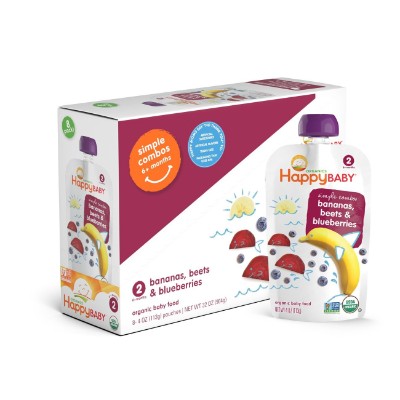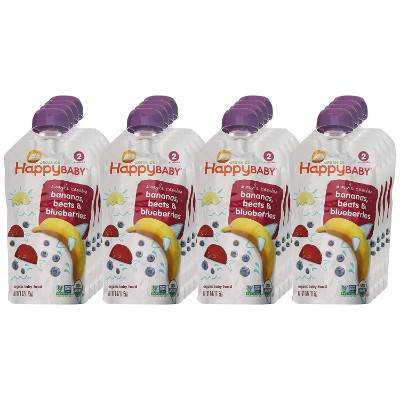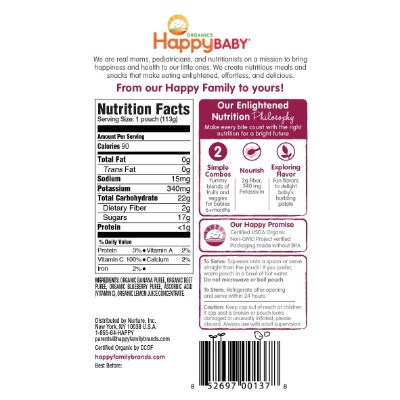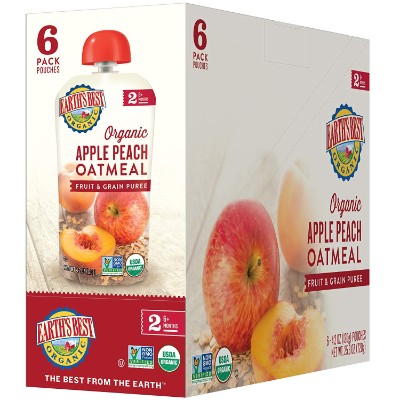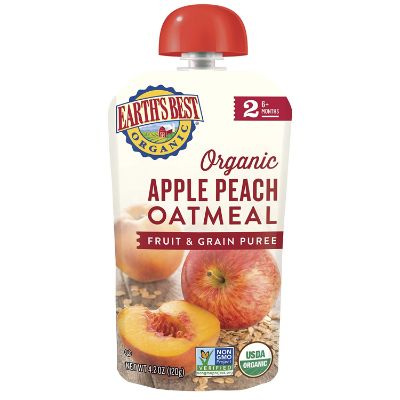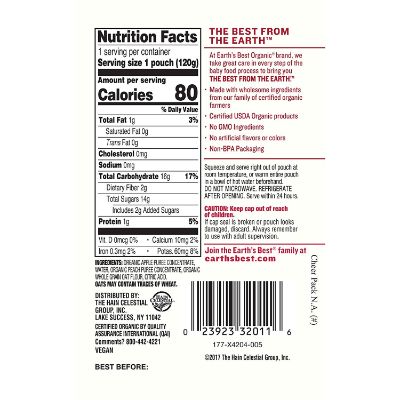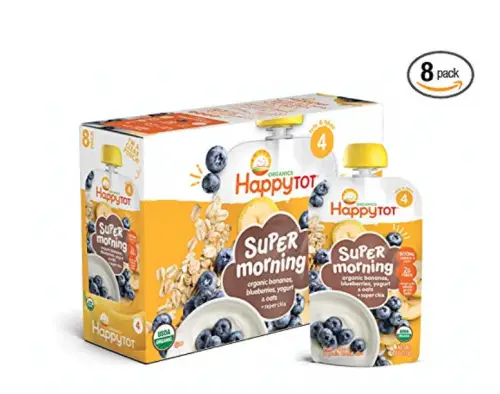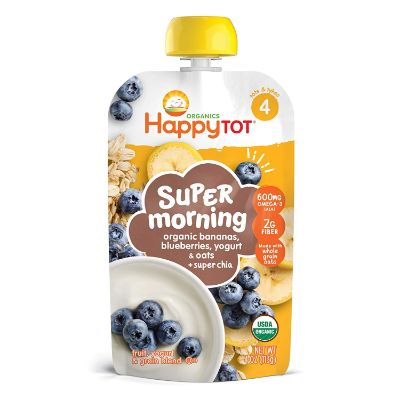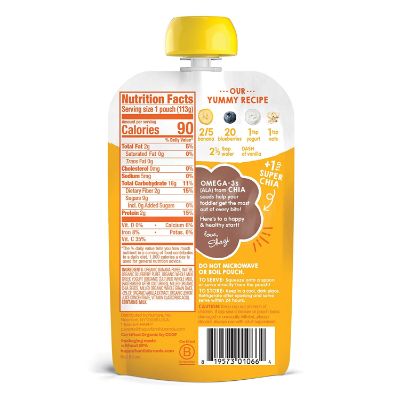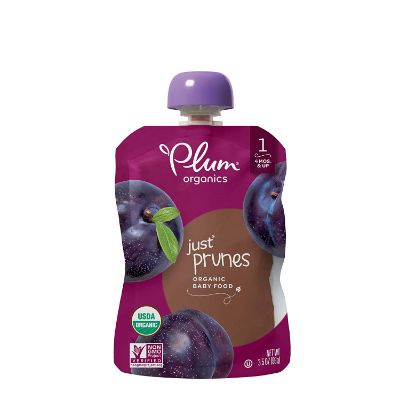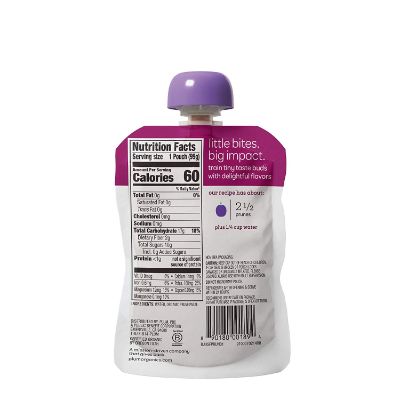9 Best Organic Baby Food Reviewed in 2024
As parents we all want the best for our children. Starting your child off on a healthy lifestyle while transitioning your baby to baby food is the best start for a healthier outcome! Typically, babies who are 4 to 6 months is the ideal age to start this transition period. Organic foods are the best due to the fact that they aren’t exposed to chemicals and other things that could potentially contaminate your baby's food. Organic foods are all free of preservatives, artificial flavors and added coloring. Whether your baby prefers fruit or veggies, we’ve got you covered! We’re sure one of the products on our top ten list below will fulfill your baby's needs!
In a Hurry? The test winner after 32 hrs of research
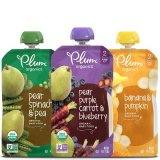
USDA organic
Convenient, BPA free packaging
Exciting flavor combinations
Excellent range of vitamins and minerals
Great for traveling

9 Best Organic Baby Foods Reviewed
1. Plum Organics Stage 2 Fruit and Veggie
USDA organic
Convenient, BPA free packaging
Exciting flavor combinations
Excellent range of vitamins and minerals
Great for traveling
Pouches are not recyclable
It’s so important for Stage 2 baby foods to focus on sophisticated flavors, but babies are not ready yet for spices and herbs. Food combinations are the ideal solution, but knowing just which foods to combine can be challenging. Plum Organics did an excellent job of combining complementary fruits and veggies for maximum flavor and nutritional value. We especially love the addition of a purple carrot, which has a milder taste and offers more health benefits than orange carrots.
Read moreIngredients
Plum Organics has a stellar reputation among baby food makers for making the product that is pure and safe in every way, from the ingredients to the packaging. This fruit and veggie variety pack contain 18 pouches of three healthy and yummy flavor combinations: pear, spinach & pea; pear, purple carrot & blueberries; and banana & pumpkin. As a stage 2 line of foods, these are ideal for babies 6 months and up. At this point, your baby is ready for a combination of fruits and veggies, which offer more sophisticated flavors.
Materials
Such unique flavors help develop a love of complex, healthy foods early in life, thereby fostering a life-long love of fruits and veggies. The flavors of these foods, by the way, are completely authentic. In fact, many adults who have to eat pureed foods as a result of serious medical conditions rave about the fresh, genuine taste of these combo meals. It says a lot about baby food when even adults like it! Each resealable pouch, containing enough food for several meals, makes it easy to customize portions of your baby’s preferences.
Green Factor
The pouches are 100% BPA free with a child safe, recyclable cap. Contaminants in plastics is a big concern among parents who purchase baby food in pouches, so it’s very reassuring to know that these are BPA free. Your baby’s digestive system is ready for so many different foods at the 6-month stage, but it’s hard to know where to start, or what foods to combine. Plum Organics does all the work for you with fruits and veggies that are proven to satisfy babies’ palates. The main reason why these foods taste so good is that they are made with USDA certified organic, non-GMO ingredients. These ingredients are gently cooked and pureed with no artificial flavors or sweeteners. So what you’re getting is a pure food product without the scary chemicals and contaminants. It’s no wonder everyone from babies to toddlers to adults goes absolutely gaga over these organic baby food pouches!
2. Mama Bear Pouch Apple Banana
Authentic taste
Gluten Free
No genetically modified ingredients
Large, easy twist cap
Hard to squeeze out when cold
Caps present a choking hazard
We love that MamaBear goes beyond the basic requirements for organic certification. They’re highly focused on the mechanical aspects of food production, which is essential for making safe, non-contaminated food that keeps its nutritional value. While taste is the quickest, easiest to get our babies to eat, the food itself has to be full of essential vitamins and mineral during this critical stage in a baby’s growth. MamaBear’s well-rounded approach to organic baby foods is something we have no problem supporting.
Read moreIngredients
Mama Bear’s 12 pack Stage 2 baby food pouches are full of yummy organic fruits such as apples and bananas. This company is super vigilant about the purity of their products, which are USDA organic, gluten free, non-GMO and Kosher certified. They also steer clear of artificial colors and flavors, so you can be sure that your baby is getting fruits that taste like the actual fruit, and nothing else.
Materials
The purity of the product is preserved through heat treating after cultivating, which makes this an excellent choice for babies and kids with compromised immune systems. We mention kids, by the way, because toddlers and preschoolers love snacking on these! Many parents keep these as healthy juice/solid hybrid snacks that travel well in backpacks and lunch bags.
Green Factor
Things that taste great to kids of multiple ages are so helpful in households with multiple children, or even on playdates. The foods in these pouches taste just like what is advertised on the package, thanks to Mama Bear’s no-additives cooking process and their commitment to rigorous safety and quality standards. These standards include their Kosher certification, which was awarded by the Orthodox Union, the world’s largest Kosher certification and supervision agency.
3. Happy Baby Superfood Puffs
Choline for brain and eye health
100% daily value of Vitamin C
Dairy and gluten free
Made from organic rice flour
Made in the U.S.
Somewhat bland flavor
Goes stale quickly once opened
What really got us hooked on these was the texture, which is perfect for babies at this stage. At this point, they may only have one or two teeth but have the ability to break down soft, melty foods with their gums. These puffs start dissolving as soon as babies put them in their mouth, so there’s no need to worry about them hurting their delicate gums. We do, however, recommend checking with your pediatrician before giving these to your baby.
Read moreIngredients
Most babies between 6 to 8 months develop the ability to grab and bring things to their mouths. This is the ideal time to introduce Stage 2 and 3 foods in snack form, like these delightful Superfood Puffs from Happy Baby. Babies have a choice of 6 flavors: sweet potato & carrot, kale & spinach, banana & pumpkin, apple & broccoli, purple carrot & blueberry, and strawberry & beet.
Materials
Each flavor tantalizes your baby’s taste buds with unique fruit and veggie combinations, and a melt-in-your-mouth texture. Aside to the nutritional value, finger foods promote self-feeding and hand-eye coordination skills. Skills development is further enhanced by the addition of choline, an essential nutrient with many health benefits for the nervous, endocrine and digestive systems. It’s particularly important to get choline from organic health food sources since the body can only produce a small amount of it on its own.
Green Factor
As babies transition from Stage 2 to Stage 3 foods, they need complex textures to feel fully satisfied and mentally challenged. Curiosity and interest in food translate into all other areas of life, so it’s important to offer foods with chewy and crunchy textures that still dissolve easily in the mouth. It’s also at this point that kids start being interested in chips and crackers, many of which contain high levels of refined carbs, sugar, salt, and other additives. Happy Baby puffs are certified organic with no gluten or soy, so you can feel safe about letting your baby munch away on these in between meals.
4. Gerber Fruit & Veggie Variety Pack
BPA free pouches
Great flavor combinations
Smart Flow Spout
Excellent source of Vitamins A and C
Texture can be a bit grainy
Putting food into a bowl may not be feasible depending on where you’re at, but glass jars don’t travel well. Solving this dilemma requires food pouches that allow for direct squeezing onto the spoon. Doing so is a cinch with Gerber’s Smart Flow spout, which is so easy to use even older kids can squeeze the pouch if they want to help feed the baby. It’s such a relief to know that we can feed our babies wholesome, organic fruits and veggies, no matter where we’re at.
Read moreIngredients
Gerber has been a trusted maker of baby foods since 1927 when founder Dorothy Gerber began making pureed baby foods for her daughter in their family kitchen. That heritage of nourishing babies with all natural foods continues today with Gerber Organic Second Foods. These convenient baby food pouches contain a variety of fruits and vegetable that are certified organic and non-GMO, with no salt, no added starch, and no artificial flavors or colors.
Materials
Each delicious puree flows nice and easy onto the spoon thanks to Gerber’s proprietary Smart Flow technology. This technology controls the flow through a smaller opening in the spout, resulting in 100% mess-free meals that are 100% delicious!
Green Factor
Gerber has strong, long-standing relationships with organic farmers throughout the U.S., so they know exactly how their fruits and veggies are grown and harvested. In addition to a safe, organic product, you’re also getting vibrant flavors and textures, all of which are crucial to helping babies develop their palates. The texture, in particular, is great for babies who are tired of watery Stage 1 purees. Even grownups rave about the taste and texture of these baby foods!
5. Peter Rabbit 4.4-Ounce Pouches
BPA-free packaging
Does not need to be refrigerated
USDA-certified organic
Pouches can easily be grasped by tiny hands
Green color may discourage a child from eating it
With the pouch being lightweight and easy to squeeze, children of all ages can enjoy eating these without any help. The lack of refrigeration required makes it easy for them to take pouches on the go.
Read moreIngredients
Stock up on snacks for your child’s lunch box with this 10 pack of Peter Rabbit squeeze pouches. Each pouch is 4.4 ounces and contains an organic blend of apples, spinach, and peas. However, when purchasing you can choose between 15 different flavors.
Materials
None of the flavors have been diluted with water so your child will be receiving all of the vitamins from the vegetables and fruits. The blend is USDA-certified organic and the packaging is BPA-free, so your child is completely safe to enjoy this tasty treat.
Green Factor
As your child squeezes the pouch, they will be increasing their fine-motor skills while also receiving a healthy dose of nutrients. These pouches are lightweight and do not need to be chilled, thus making them the ideal on-the-go snack.
6. Happy Baby Bananas, Beets & Blueberries
Mild, basic food combinations
Non-GMO Project Verified
Kosher certified
BPA free packaging
Watery texture
Caps present choking hazard
These foods have a finely pureed texture, somewhere between juice and smoothie. That makes it a great choice for introductory Stage 2 foods when babies are easing into more solid textures. They transition quite well as babies achieve eating milestones such as eating chunky foods. At that point, grains like oatmeal can be added for a thicker, more complex eating experience. Or, they can be used for self-feeding when they get old enough to hold the pouch on their own.
Read moreIngredients
Stage 2 is that middle milestone between Stage 1’s single foods and Stage 3’s exotic flavor combinations. Happy Baby starts them on the right path with Simple Combos, a line of organic foods with basic, easy to digest combinations of fruits and vegetables. Ingredients include bananas, beets, strawberries, and cherries, just to name a few.
Materials
These organic ingredients are blended into a smooth puree with no GMOs, added sugar or artificial flavors. Each serving contains 2 grams of fiber, 100% daily value of Vitamin C, and 340 mg of potassium. Potassium is particularly important for digestive and muscular functions, so it’s important to replenish your baby’s natural supply on a daily basis.
Green Factor
We love that these combos offer a rich array of Vitamin C and potassium sources such as beets, cherries, and blueberries. We were especially happy to see blueberries since bright, deeply colored berries are an excellent source of antioxidants, which have been proven to delay or prevent various types of cell damage. Even better, all these flavorful nutrients are packaged in an easy squeeze pouch that dispenses easily into a bowl or spoon. These can also be given to Stage 4 babies and toddlers who are able to drink right from the pouch.
7. Earth's Best Stage 2
The pouch can be resealed
No added starches or artificial colors
Tiny hands can easily open and squeeze these pouches
Lightweight and easy to transport
Some babies may not like the texture of the oatmeal
These pouches are the perfect on-the-go organic snack as they are lightweight, small, and sealed by a screw top. The top also makes it easy for you to save any amount of puree that your child couldn’t finish for later.
Read moreIngredients
Babies who are 6 months and older can enjoy Earth’s Best Organic fruit and grain puree. This particular blend is composed of apple, peach, and oatmeal but these pouches are available in 18 different flavors. This tasty puree is non-GMO and has been certified organic.
Materials
These are super-healthy for your little one as they do not contain any artificial flavors or added starches. Whichever flavor you choose, your child will receive a healthy dose of protein, fiber, and vitamins.
Green Factor
If your little one can’t finish the whole pouch in one sitting, simply screw the top back on and save it for later. Each pouch is lightweight and can easily be squeezed by tiny hands. Not only does the screw top make it easy to save the leftover puree for later but it also makes the package easy to open and keep it from spilling out.
8. Happy Tot Super Morning
Organic
Made with omega 3s and fiber
Great for picky eaters
Not made with reusable packaging
The Happy Tot Super Morning Baby Food blend is the perfect morning meal for your baby. Not only is it organic, but each pouch has 3g of fiber and omega 3s. It has all the carbs, protein and nutrients your little one needs in a morning meal.
Read moreIngredients
The Super Morning Baby Food blend is made with fiber, organic fruits, whole milk, and whole grain oats - making it a perfectly delicious breakfast (or lunch) food for your baby. All of Happy Tots ingredients are organic and made from premium recipes.
Materials
The Super Morning Baby Food blend has all of the vitamins, minerals, protein, fat, and nutrients needed in a meal. Happy Tot makes fantastic, organic meals for babies including recipes for many different life stages. Happy Tot also has snacks, smoothie pouches, puffed grains and more.
Green Factor
All of Happy Tots products are organic and nutritious. The recipes are made with babies in mind, so each recipe is safe to little ones to consume. They are also packed full of essential nutrients.
9. Plum Organics Stage 1 Super Food
Certified organic
Non-GMO Project verified
Made of whole fruits
Kosher
Resealable packaging
Not a lot of variety
The Plum Organics Stage 1 Super Food is a great meal option for your little one. Certified organic and GM-free, it doesn’t have any added sweeteners. It is also great for on-the-go feeding.
Read moreIngredients
The Plum Organics Stage 1 Super Food is made of entirely organic, whole fruits. There are no added sweeteners, it is kosher, and it is even GMO-free.
Materials
Made with whole fruits and blended to perfection, the Plum Organics Stage 1 Super Food is perfect for on-the-go feeding. Each pouch is made with different fruits and veggies, and all of their pouches are good for gut health.
Green Factor
The pouches that Plum Organics is made with is re-sealable, so you don’t need to keep throwing away unused materials. It is also organic and GMO-free, making it great for the environment and your baby.
Criteria Used for Evaluation

Ingredients
One important thing that we considered when coming up with our top ten list above is making sure that every item on our list was organic. We know that there are many products out there that can claim that they’re organic but one important factor for those going the organic route that parents need to look for is making sure that each organic item followed the regulations of the United States Department of Agriculture’s National Organic Program (NOP). The main thing about this program is they establish the official rules for how organic baby products have to be created and how they have to be processed. This process also includes not just food, but nonfood products as well.The reason why this process is crucially important is because this program is for crops and livestock, mainly

Materials
Organic food is all about good nutrients. Going the organic route parents know that they will be getting good nutrients in their family's bodies without having to worry about certain in chemicals. With organic food there are numerous vitamins, minerals, and dietary fibers. For babies just starting out learning the different tastes and textures of baby foods, parents should start with ones that say: Stage 1. Stage 1 foods provide nutrients like potassium, iron, protein, and calcium. Most of these vitamins can be found in fruits and vegetables.

Green Factor
Pouches are pretty much the go-to method for baby foods, and we understand why. They travel well, and most of them give you the option of squeezing food into a bowl or onto a spoon. Most of them are easy to squeeze with small spouts, so most older babies are able to drink right from the pouch. For this list, we only chose companies that use BPA-free pouches, with some going so far as to make even the caps BPA-free. However, our primary concern is that the pouches are BPA-free since it’s unlikely that the foods will come in contact with the caps. Even if the food does get on the caps, parents typically wipe that away before feeding or giving the pouch to their babies.
The organic board is working towards a complete ban on all synthetic substances. For food growers and producers, it must be approved by a USDA – accredited certifying agent who verifies that their products meet the NOP’s stringent guidelines. That’s why we recommend and can’t stress enough for parents to make sure that when selecting organic baby foods their product has this certification.
Parents often choose organic products because they’re looking to give their baby the best nutrients. They don’t want to worry about chemicals, processed food or anything with artificial flavors or colors. Baby foods should be real foods for baby rather then something that’s bland or discolored. Your baby is entering the world of discovery and they want to develop taste and learn about every food that’s out there.
By the way, BPA-free pouches should be the norm, not the exception of organic baby foods. Companies began coating food containers and even plastic wrap with BPA in order to keep foods fresh for longer periods of time. However, organic foods are so fresh and pure that they are not expected to keep for more than two days, even in the fridge. They are expected to be eaten quickly in order to get the most flavor and nutrients from the food. Hence, the usage of BPA goes against the whole principle of organic products, which is why we do not support its use for organic baby foods.
Proponents of rice cereal point out that many brands are fortified with iron, which babies initially receive from breast milk. As babies move onto solids, they need to get iron from food sources, so infant cereal does seem like a good choice. But there’s no advantage in choosing infant cereal over anything else, according to the American Academy of Pediatrics (AAP). In fact, organic, unadulterated fruits and veggies provide the widest range of vitamins and minerals for healthy growth and development. They’re also far tastier, and foster a preference for fruits and veggies that will stay with babies for the rest of their lives.
Some other foods that your baby should not have during the first year are shellfish, egg whites, wheat, and citrus fruits. Other foods like milk and peanut products are much more controversial. Peanut butter, for example, was long believed to be the cause of peanut allergies when introduced during the baby years. However, recent research shows that early introduction of peanut butter may actually lower a child’s risk for a peanut allergy. On the other hand, you may still want to avoid foods that you or other close family members are allergic to since food allergies tend to run in families. Your pediatrician can take all these factors into account, and give you a much more customized, comprehensive answer.
Other Factors to Consider

Brand
We know that there are various products out there in today’s market of the best organic products. The last thing a parent wants to do is spend any of their limited free time trying to narrow down and figure out which is the best product they could get for their baby. Well, we did the research for you. We tasked our research team by coming up with an important criteria method when coming up with our best ten products and made sure each product met our standards.

Compatibility
When coming up with our list we made sure that we paid close attention to two important factors when coming up with our top ten list. We made sure that each product on our list had certification from the USDA and their nutritional value. We want nothing but the best of the best for your children and we hope that this answers some of the questions on whether you’ve decided or are still deciding on going the organic route for your baby. Whatever you decide we’re sure that you will find a product on our top ten list that your baby will love. Please take a look above and check out our FAQ if you have any other questions.
Frequently Asked Questions
q: Shouldn’t infant cereal be a baby’s first solid food?
Past generations relied heavily on rice, of infant cereals, as a transition solid for babies. It makes sense since it’s very soft, and can easily be mixed with water, breastmilk or baby formula. However, pediatricians in recent years have come to the conclusion that it’s best to start a baby on whole fruits, vegetables, and meats. As long as they’re finely pureed, without additives or preservatives, these foods offer far more nutritional value than infant cereals.
q: Do I have to stick to specific foods at each stage?
Some parents are religious about which foods belong in each stage, and there’s no real harm in sticking with those rules. Still, each baby is different in needs, preferences, and development. Some babies are ready for the complexities of Stage 3 foods at 6 months old, while others may need to stick with Stage 1 foods for most of the first year. While there are signs to help you decide your baby’s readiness for certain foods, you should always consult your pediatrician in order to make an informed choice. Input from your child’s doctor is particularly important for babies with pre-existing health conditions such as food allergies.
q: Are glass jars safer than pouches and canisters?
There was a time when sterilized glass jars were safer than plastics, which were typically coated with harmful chemicals, notably bisphenol A, or BPA. However, all the plastic food pouches on our list are BPA-free. Some parents still get nervous when the caps are not BPA-free, but baby food pouches usually have small, sealed spouts. That makes it highly unlikely for any of the food to come in contact with the cap.
It should be stressed that BPA is particularly problematic when containers are heated. That’s why baby foods should be gently heated in warm water while it’s still in the BPA-free pouch. There are gentle, safe ways to microwave, but it should always be done in BPA-free containers. However, we’ve found that it’s very difficult to heat baby food evenly in a microwave, which is why we recommend the warm water method over anything else.
q: What’s the best way to introduce solid foods to my baby?
There’s frankly no one answer to this question, but many parents start with placing tiny, soft pieces of food on the high chair tray. Most babies will reach out and grasp the food with a little prompting. Other parents prefer spoon feeding by starting with just a couple of spoonfuls for the first few feedings, ideally after nursing or bottle-feeding. The food should be finely pureed to a watery consistency, which is exactly what you’ll get with the Stage 1 foods on our list. We recommend using a soft-tipped plastic spoon to avoid injuring your baby’s gums.
The foods on our list work perfectly for this method, especially the food pouches that allow you to squeeze directly onto the spoon. If you’re using baby food in glass jars, put a small amount onto a dish or in a bowl. Dipping the spoon back into the jar after it’s been in your baby’s mouth results in bacteria transference, which will stay in the jar for however long you keep the food. Regardless of the packaging, you should use up opened baby foods within two days, since organic foods go bad much quicker than non-organic foods.
q: Does it matter which food group I introduce first?
The general answer is no, although it’s easiest to start with fruits since they’re naturally sweet. They’re also the easiest to puree down to a fine, liquid consistency. There seems to be a prevailing belief that a single veggie or grain should be introduced first in order to prevent the baby from developing a “sweet tooth.” There has been no conclusive evidence to prove this, so we believe it’s best to leave the decision up to each individual parent.
We recommend introducing a new food every few days so that your baby has time to get used to a specific food. Slow, gradual introductions also help you determine if your baby has any food allergies or digestive issues. Once your child is doing well on a variety of single foods, you can transition into simple combinations, like Happy Baby Organic Simple Combos.
q: What foods should I absolutely avoid?
Parents get so excited about the things they can feed their babies, but it’s just as important to know which foods to avoid. Your pediatrician is the best source of information for your specific baby’s needs, but there are some basic foods that should not be given to babies during the first year. On top of our list is honey, especially the raw, organic variety. We recommend avoiding it in all forms, however, since it has been linked to botulism. You should avoid sweeteners for the first year, anyway, even natural ones like honey.
Sources
- , Introducing solids, Informational Blog Article
- , Are infant cereals really the best first food for babies?, Informative Article
- , Feeding Baby Pumpkin Baby Food – Pumpkin Baby Food Recipes for Baby, Informative Article
- , Gerber's history & heritage, Informative Article
- , nutrition-infant-food-introduction faqs, FAQ Article

